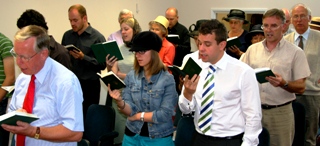The Bible comes before us, demanding to be heard as the word of God.

Saint Peter as Pope by Rubens
“Thus saith the Lord”, and phrases like it, are an integral part of the fabric of the Old Testament. To remove all those parts of scripture claiming Divine inspiration for themselves, or recognising it in others, would leave but little remaining. The Apostle Peter’s claim that the Jewish scriptures were produced when
“holy men of God spake as they were moved by the Holy Spirit” (2 Peter 1:21)
is either true or it is a pious fraud. But when we realise the extent to which the Lord Jesus Christ himself – not to mention his apostles – recognised that same Old Testament as the authoritative word of God, there ought to be no doubt that the attitude of a true follower of Christ should be the same.
“Have ye not read?”; “It is written”; “What saith the scripture?”
– these were favourite phrases of the Master when referring to the largest part of
what we now know as the Bible.
Significantly too, the Lord Jesus claimed no less of an inspired authority for his own words (see John 17:8); he promised his apostles that they too would be supernaturally guided by the Holy Spirit (John 14:26; 15:26,27; 16:13-15); and the early Bible Christians took it as a foundation doctrine that
“all scripture (both Old and New Testaments by then) is given by inspiration of God, and is profitable …” (2 Timothy 3:16).
Such a challenging claim by the Bible about itself leaves no middle way for our personal reaction to its message. We must either accept or reject it. For if the claim is false, then the Bible’s message is of no real value, and the Gospel of salvation it contains is but a figment of man’s imagination. But if the claim is true, then the Bible’s message commands obedience and its Gospel offers the true hope of life beyond the grave. The Bible’s claim is no academic exercise: it is a matter of life and death.
If there is a God who created the world, would He not be interested to follow what happened to His Creation? Doesn’t it make sense that he’d be interested in what goes on in the world? And if God is bigger and more powerful than all creation, and He intervenes with what happens in the world, wouldn’t people be dazzled by what He does? When things happened in history which do look incredible, would not many wonder Who is behind it? Fantastic events are possible. Miracles can happen. You can’t just disqualify them.
Some Bible books recite what God has done in people’s lives — like 1 and 2 Kings. Other books, like Isaiah, show God speaking directly to us through the voice of a prophet. Isaiah doesn’t just reflect on his personal experiences with God. He speaks for God, and God actually speaks through him.
The followers of Christ were pushed into an underground movement. At first they could meet with the other Jews, and also assembled in the Jewish temples, but because too many gentiles joined the movement “The Way” they became excluded from the temple grounds and later the Christians couldn’t even hold public meetings until the 4th century.
Though already soon after the Comforter (the Holy Spirit) had made the apostles not afraid any more to go out in the world to preach the Gospel of the coming Kingdom of God, the apostles were confronted with false teachers. To warn their members they started edifying letters and told them what they should believe, what they could and what they should read. (This happened already before there was an “official” New Testament.)

Illumination of St. Mark – 11th century Trebizond Gospel (Russian State Museum, Saint Petersburg).
When we look at the historical credibility you could ask if one of the 12 disciples or the convert and letter writer Paul stood behind certain writings? Matthew was an apostle, and he was with Jesus, so his book holds a lot of weight. Mark (John Mark) wasn’t an direct disciple from the beginning, but was one of the Seventy Disciples sent out by Christ (Luke 10:1), as is confirmed by the list of Hippolytus. Mark could have been one of the servants at the Marriage at Cana who poured out the water that Jesus turned to wine (John 2:1–11). He had heard and seen enough about his fellow Jew Jeshua from Nazareth. As Cousin of Barnabas he served with him in Rome (2 Timothy 4:11), though some think the evangelist Mark could also be an other person than the one Paul mentioned explicitly in his letter to the Colossians (Colossians 4:10) but we know for sure that Mark the evangelist worked with Peter, and Peter was with Jesus; that’s why Mark’s book holds weight.
Many books claimed “apostolic connection,” but some of those claims — like the Gospel of Thomas — were fraudulent. Some critical scholars suspect that the reference to Didymos (Greek) Judas Thomas (Aramaic) the Apostle Thomas is false, and that therefore the true author is unknown. {April D. De Conick 2006 The Original Gospel of Thomas in Translation ISBN 0-567-04382-7 page 2} It belonged possibly to the proto-Gnostics. Unlike the canonical Gospels, it is not a narrative account of the life of Jesus. Instead, it consists of logia (sayings) attributed to Jesus, sometimes stand-alone, sometimes embedded in short dialogues or parables. The text contains a possible allusion to the death of Jesus in logion 65 {De Conick, April D., The Original Gospel of Thomas in Translation, 2006, p.214} (Parable of the Wicked Tenants, paralleled in the Synoptic Gospels), but doesn’t mention crucifixion, resurrection, or final judgement; nor does it mention a messianic understanding of Jesus. {Alister E. McGrath, 2006 Christian Theology ISBN 1-4051-5360-1 page 12 + James Dunn, John Rogerson 2003 Eerdmans Commentary on the Bible ISBN 0-8028-3711-5 page 1573} Bishop Eusebius included it among a group of books that he believed to be not only spurious, but “the fictions of heretics”. {Church History (Book III), Chapter 25:7 and Eusebius}
Nowhere in the Book of books, the Bible or Holy Scriptures, are there certain writings listed as the ones to be read and to believed in. At no place in the Holy Scriptures do we find a list of the books that are supposed to be in this so called Bible. Some may even think that nowhere in the Bible does it clearly tell us how to use the Bible, but for those we can say to have a closer look at the many texts.
Wise bishops in the early church examined the many writings which were produced and came known at the time by many. For those writings they checked who could be the author and what would have been his connection with the apostles and with Jesus himself. They also asked if that person, like for example Thomas could really be the author. An other point to be questioned was the relevance to its teachings and to the teachings of the first disciples of Christ Jesus. They also questioned if the writing reflected the spiritual and theological commitments of the other books. With the Gospel of Thomas, the answer was “no” on both counts.
At the time when the Biblical writings were written people knew what had happened and how it had happened. The writings were not put together in secret and they were available to many, also non-believers and critics. The coming together of the Book of books was a very public process which took many centuries. People have been able to closely examine its claims all along, even to this day. And Christians welcome that kind of scrutiny, because we know our Bible can stand up to it.
At the time of the Nazarene Jew Jeshua (Jesus Christ) everything what was told about him, was seriously checked. Because he also was a person not liked by many, people could read the stories and would have reacted strongly against anything which was not conform to the eyewitnesses or to what really had happened. The life of Christ was evaluated, studied and examined by the people who had lived when Jesus lived, and could verify the accuracy of those stories.
Everybody can do historical research on the Bible to find out if it’s reliable.
Whilst the historicity can be proven it is more difficult for the inspirational matter. But historical and modern evidence that Biblical stories are true and haven’t been proven wrong is no basis for the Christian belief in an Inspired Bible.
+
Please find also:
- Unsure about relevance Bible
- The Bible: God’s Word or pious myth?
- Bible, Word of God, inspired and infallible
- Why believing the Bible
- Inspired word
- Did the Inspirator exist
- Who Wrote the Bible?
- Bringing Good News into the world
- Pure Words and Testimonies full of Breath of the Most High
- God, Creation and the Bible Hope
- Power in the life of certain
- Bible for you and for life
- Appointed to be read
- Bible a guide – Bijbel als gids
- Scripture alone Sola Scriptora
- Old and New Testament not discordant
- The Bible is a today book
- Bible like puddle of water
- Of the many books Only the Bible can transform
+++
Additional reading:
- Mark the cousin of Barnabas
- Why Believe the Bible?
- Why should we believe in the Bible?
- Why Do We Believe the Bible Is the Word of God?
- Why we believe the Bible to be the inspired Word of God
- Why Do I Believe that the Bible is the Word of God?
- Why believe the Bible? Why Believe Bible.com
- 10 Reasons to Believe In The Bible
- How does archaeology support the Bible?
- Has the Bible changed over time, or do we have what was originally written?
- Are the gospel accounts of Jesus reliable?
- Do historians confirm what the Bible says about Jesus?
- Are there contradictions in the Bible?
- How were the books of the New Testament determined? Why not the gospel of Judas?
- Why did it take 30 to 60 years for the Gospels to be written?
- Does it matter if Jesus really did and said what is in the Gospels?
+++
Preceding article: Miracles of revelation and of providence 2 Providence
Next: Challenging claim 2 Inspired by God
Dutch version / Nederlandse versie: Uitdagende vordering 1 Wiens Woord
Related articles
- How do you know that the Bible is really Divinely inspired? (924jeremiah.wordpress.com)
Within the Christian Church there are several different biblical canons (collections of books) in use. Some denominations include more books in their Bibles—books which they believe to be every bit as inspired as the rest of Scriptures. Yet other branches of the Church reject these books as not inspired enough to warrant a place within our sacred Scriptures. Some Bibles include additional material for the books of Daniel, Esther, Psalms, and Jeremiah—material that other Bibles intentionally leave out.
+
One by one, they were pulled out of a vast sea of written material and declared as Divinely inspired. First the Jews gathered together the books we now call the Old Testament. Later on, Christians decided to trust the Jews’ judgment about their Scriptures being Divinely inspired, and then they added on more documents which we now call the New Testament. So when you read your Bible, you’re rifling through a collection of documents that some total strangers decided were trustworthy.
+
God is in absolute control of this universe, yet He allows people to print lies and blasphemy about Him all the time. Just because God lets a book become published doesn’t mean He approves of its contents. We can’t just throw some documents together willy-nilly and call it a Divine revelation. Since you didn’t personally assemble the contents of your Bible—since you didn’t rifle through all the other documents available and do some serious studying and praying and comparing to see what sounded like an authentic message from God versus just someone’s opinion, how do you know that what you’re reading is really true? We can’t base our lives on words written by human hands simply because those humans claimed to be inspired by God. Any nutcase can claim to be inspired by God. Plenty of people claim the Quran is inspired by God. Others say the Book of Mormon is a sacred text that we should all be putting our trust in. Who’s right and who’s wrong? Are you going to risk the fate of your own soul based on someone else’s claims? - Standing on the Jewish Foundation of the Bible (mymorningmeditations.com)
If we’re supposed to have one, unified Bible that is all “God breathed” (2 Timothy 3:16), that is, if everything we read from the first chapter of Genesis to the last words in Revelation all originate from the same source, from God, then everything in the Bible must be internally consistent and provide a single, cohesive revelation from God to humanity.
+
A Jewish man named “Yeshua” or “Yeshu” may have lived in the late second Temple period and taught along with many other itinerant Rabbis, but if he thought he was the Messiah, his death proved he was not. The Tanakh is the extent of God’s revelation to mankind. The New Testament is a radical distortion of the teachings of Jesus, and Paul, in writing letters directly contradicting the Torah and the Prophets, was a liar, hypocrite, and a traitor to the Jewish people, to the Torah, and to God. - Book Review: The Doctrine of the Bible, by David S. Dockery (shawnethomas.com)
Many Christians of the last generation have sold out to “creativity” — often at the expense of truth. While The Doctrine of the Bible is not “exciting” reading, Baptists across the board would profit greatly from a familiarity with its contents.
+
“One of the key issues in developing a doctrine of Scripture is the need to maintain with equal force both the divinity and humanity of the Bible.” (p. 55) Dockery asserts: “the incarnation provides the only analogy” of this. On p. 56 the analogy spelled out:
– Jesus was conceived by the Holy Spirit; Scripture is product of Spirit’s inspiration
– Jesus took human form through a human mother; Bible came in human language/authors
– Jesus is the living Word; Bible is the written Word
“Scripture is completely the Word of God and the very words of humans” (p. 56) — just as Jesus Christ is not 50% Man, 50% God, but both fully human and fully Divine. - The Holy Bible is the Word of God (ourfathershavetoldus.wordpress.com)
The phrase “God said” is used 46 times, and the phrase “God spoke” is used 12 times.
+
It only takes a cursory look at Scripture to realize that its Author is non-other than God Himself, and God’s Word is eternal because it shares His attributes. - Salvation: An Introduction to the Bible (joshkennel.wordpress.com)
The old meaning of the word “inspiration” refers to the act of breathing out. If you hold your hand up to your mouth and say the word “Peter” you can feel the breath on your hand. 2 Timothy 3:16 is teaching us that the words of the Bible originated with God. Now just because a book claims to come from God doesn’t mean that it did, but don’t miss the significance of the statement. Most books don’t claim to be the revelation of God. Also, the Bible is not some off-the-wall book. It has been trusted by great men and women for thousands of years.
+
There is no need for people to add teachings to the Bible nor is it possible for anyone to effectively do so.If you have never read the Bible or you have stopped reading it, now is the best time to begin (again). We have no assurance that we will live through the next night. There isn’t a “right” place to start reading the Bible. I would suggest starting in the New Testament with The Gospel of John and Paul’s Letter to the Romans. - Why I believe in Jesus Christ as my Lord and Savior (rootedinchrist.org)
Years ago I became a Christian at the age of 6 and though I was young I had a good understanding of who Jesus Christ was, why He came, and what He did for me.
+
Christian faith is not blind faith, but faith established through history with real people, events, facts, and witnesses. Many people think that Christianity is built upon myths, fairy tales, and fictional stories, but those things are false. The Bible is a collection of books (66) written from over 40 different authors, written from 3 different continents, and written over a time span of 1500 years. (more information about the Bible click here)One of the most amazing evidences of the Christian faith is that it is built upon real witnesses who knew Jesus personally! People like John, Peter, Paul, and many others who experienced Jesus Christ personally. - What’s the right way to read the Bible? (travismikhailblog.wordpress.com)
The right way to read Sacred Scripture is to read it prayerfully, in other words, with the help of the Holy Spirit, under whose influence it came into being. It is God’s Word and contains God’s essential communication to us. - The Reality is… (kswptim.wordpress.com)
Paul was inspired by the Holy Spirit to write the letter. - Thomas Helwys, the Baptist Church, and the Churches of Christ (godsbreath.net)
In 17th century London, Thomas Helwys strove to faithfully follow the New Testament scriptures using the Geneva Bible, and his beliefs still challenge Baptists today to reconsider their current beliefs and pursue to be the Church of Christ Jesus in the Bible.
+
If now a false church be not no church of Christ, then it is a false church of Christ, So is there two sorts or kinds of churches of Christ, and so should Christ have two bodies, a true body, and a false body. What a blasphemy is this, when the apostle says, ‘There is but one body.’” (Helwys. In Mystery of Iniquity. Ibid. P.99-100). - The Son of God Was the Son of David (blogforthelordjesuschristianleaders.wordpress.com)
With the benefit of hindsight and 27 books of the New Testament, we can solve the riddle that the Pharisees could not. That is, Jesus was the son of David according to the flesh and the Lord (or son of God) according to the spirit by virtue of his resurrection from the dead.












 Belgian Biblestudents
Belgian Biblestudents Christadelphian Ecclesia
Christadelphian Ecclesia





Pingback: Uitdagende vordering 1 Wiens Woord | Broeders in Christus
Pingback: Challenging claim 2 Inspired by God 1 Simple words | Broeders in Christus
Pingback: Challenging claim 3 Inspired by God 2 Inerrant Word of God | Broeders in Christus
Pingback: Getting out of the dark corners of this world | From guestwriters
Pingback: God’s wisdom for the believer brings peace | From guestwriters
Pingback: Marriage of Jesus 1 Mary, John, Judas, Thomas and Brown | Stepping Toes
Pingback: Marriage of Jesus 8 Wife of Yahweh | Stepping Toes
Pingback: Challenging claim 4 Inspired by God 3 Self-consistent Word of God | Broeders in Christus
Pingback: Were Gnostics the original Christians? | Stepping Toes
Pingback: Why are you persecuting me? | Free Christadelphians: Belgian Ecclesia Brussel - Leuven
Pingback: A voice and a Word given for wisdom | Free Christadelphians: Belgian Ecclesia Brussel - Leuven
Pingback: Are there certain books essential to come to faith – Relating to God
Pingback: Reliability of message appears from honesty writers – Relating to God
Pingback: The Bible a book of books – Relating to God
Pingback: Written and translated by different men over thousands of years | Bijbelvorser = Bible Researcher
Pingback: Redemption #9 Only way | Broeders in Christus
Pingback: 2nd question: What or where is the beginning – Questiontime – Vragenuurtje
Pingback: How to Read the Bible (sequel 1) – Immanuel Verbondskind – עמנואל קאָווענאַנט קינד
Pingback: Application of old pagan concept of trinity | Stepping Toes
Pingback: Memorizing wonderfully 30 False prophets and false teachers – Belgian Ecclesia Brussel – Leuven
Pingback: Where to learn the truth | Broeders in Christus
Pingback: The Bible her revealing concerning God | Broeders in Christus
Pingback: A Book to trust #14 Writings to show The God #1 The I Am that I Am – Unmasking anti Jehovah sites and people
Pingback: The Greatness of the eternal God – Belgian Ecclesia Brussel – Leuven
Pingback: Trinitarians making their proof for existence of God look ridiculous #10 – Unmasking anti Jehovah sites and people
Pingback: Stories of the beginnings, and one Main book composed of four major sections – Immanuel Verbondskind – עמנואל קאָווענאַנט קינד
Pingback: Being comforted by the Most High and His family | Bijbelvorser = Bible Researcher
Pingback: God spoke to our forefathers and speaks to us – Belgian Ecclesia Brussel – Leuven
Pingback: Bringing over with a voice – Immanuel Verbondskind – עמנואל קאָווענאַנט קינד
Pingback: Faith in one or more gods – Questiontime – Vragenuurtje
Pingback: Revealing books – Some View on the World
Pingback: If the Bible tells us not to lean upon our own understanding, are preachers, and Bible professors, leaning upon the theirs’? | From guestwriters
Pingback: Should church members question preachers about the doctrine that is not in the Holy Bible? | From guestwriters
Pingback: Darkness, formlessness, chaos and order – Kanisa la Christadelphian huko Anderlecht
Pingback: The first assignment for man – Kanisa la Christadelphian huko Anderlecht